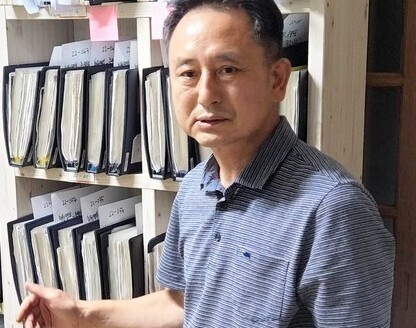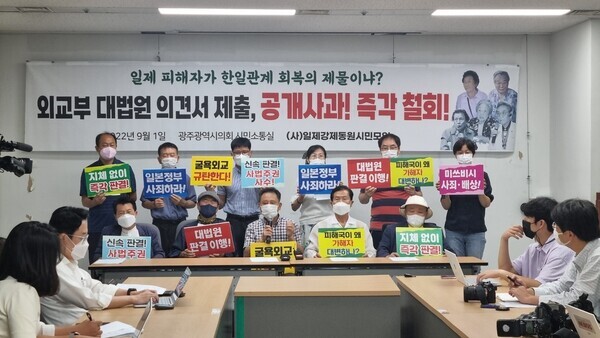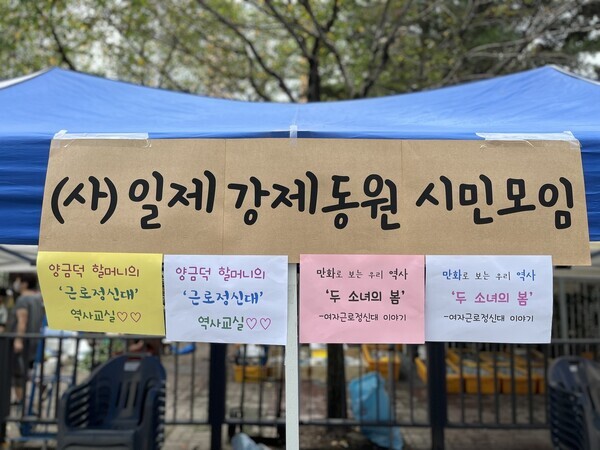hankyoreh
Links to other country sites 다른 나라 사이트 링크
Winning compensation for Korean forced labor survivors is “race against time,” says advocate

On the afternoon of Sept. 2, Yang Geum-deok, a 93-year-old survivor of forced labor mobilization during the Japanese occupation of Korea, tipped back a glass of rice wine by herself in a gazebo next to her home in Gwangju’s Yang-dong neighborhood.
Earlier that day, her home had been buzzing with dozens of South Korean and Japanese reporters, police, civic group members, and others who were there for Minister of Foreign Affairs Park Jin’s first visit with Yang. But Park had left, and the crowds had faded like a receding tide, leaving everything quiet once again.
“We won in our trial, but we haven’t gotten an apology, let alone compensation,” she said.
“I told the minister to stop taking cues from Japan, but I don’t know how much they’re going to listen,” she added, staring blankly forward.
By her side was Lee Guk-eon, the 54-year-old chairperson of the Citizens Association on Imperial Japan’s Labor Mobilization.
“[Yang] lives by herself, so she feels even sadder when people come all at once and leave all at once like they did today,” he explained.
“She’s very stout-hearted, so she gets through it well enough, but she’s in her 90s now, and her health isn’t what it used to be, which is worrying,” he added.
Speaking in his association’s offices in Gwangju’s Ssangchon neighborhood on Saturday, Lee described the situation faced by both the victims of forced labor mobilization and the parties responsible as a “race against time.” The Hankyoreh listened to his comments on the solution of the labor mobilization issue, the attitudes of the South Korean and Japanese governments, and the “memory wars” as someone who has been battling for over 20 years on behalf of victims of Korean Women’s Volunteer Labor Corps mobilization.
“Of the eight plaintiffs who first filed suit in Japan between 1999–2001 — Yang Geum-deok, Kim Seong-ju, Kim Hye-ok, Lee Dong-ryeon, Park Hae-ok, Jin Jin-jeong, Kim Bok-rye, and [the surviving family members of] Kim Jung-gon — only two of them are still alive, Yang and Kim Seong-jae,” he explained.
“The Japanese government and the companies involved in war crimes may have calculated that their actions would be buried away in history once all the victims had died,” he suggested.
“That’s why Mitsubishi has kept going after a Supreme Court ruling every time, even though the victims have won eight of their cases in South Korean courts since 2012, including the first to third trials for compensation for damages, the first to third trials for the seizure of Mitsubishi’s domestic assets, and the first two trials for the compulsory sale of the confiscated assets,” he added.

In addition to the lack of good faith from the Japanese government and companies implicated in war crimes, Lee said the South Korean government has made things even more difficult for the surviving women. Seoul has repeatedly sided with the perpetrators — by discussing a possible “subrogation” approach, in which it would pay the compensation to the victims and assume responsibility for claiming the amount from Japan at a later date, and by submitting a Ministry of Foreign Affairs opinion to the Supreme Court in July asking it to delay its ruling on the sale of Mitsubishi’s South Korean assets.
During his visit on Sept. 2, Yang gave Minister of Foreign Affairs Park Jin a letter in which she had written, “If it were about the money, I would have given up by now.”
“I cannot pass away before receiving an apology from Japan. Mitsubishi needs to apologize and turn over the money,” she stressed, adding that she would “never accept [the money] if other people give it to me.”
Lee said, “Our government keeps taking Japan’s side so that they improve relations right now, but they need to think about what outcome it has created when they’ve left the victims out of their efforts to resolve historical issues, as with the Claims Settlement Agreement in 1965 or the South Korea-Japan comfort women agreement in 2015.”
He also said, “We should focus on the fact that Japanese courts have merely said that [victims] can’t request damages from Japan, while acknowledging all of the illegalities, and they can’t stop them from requesting damages in South Korea.”
He explained that it would not compromise the rulings of the two countries’ courts for the South Korean government to assert the rights of forced mobilization victims in its dealings with Tokyo.
“In the South Korea of the past, people didn’t distinguish between comfort women [victims of sexual slavery by the Japanese military] and Volunteer Labor Corps members, so these women have had the painful experience of being mistaken for comfort women and stigmatized not only by other people, but by their own husbands and children,” he said.
“For these women, an apology and compensation from Japan would go some small way in addressing the past 80 years of injustice,” he stressed.

After graduate studies in modern and contemporary history, Lee went on to work as a reporter for OhmyNews and Simin Sori before he established a connection with the aging Korean Women’s Volunteer Labor Corps survivors.
The women who befriended him told him stories of their difficult family experiences and being unable to speak to their own children. After quitting his job as a journalist in March 2008, he began supporting the survivors in earnest with his 2009 establishment of the civic group Daegu Citizens Forum for Halmuni.
Lee has been preparing for the “memory war” to come as the last of the aging survivors pass away. He plans to share information about their lives with future generations by creating a history center, bringing together video footage of the women with archival materials, including some from the legal case filed by the late Lee Geum-ju, chairperson of the Gwangju Association of Family Members of Pacific War Victims.
“When the late Lee Dong-ryeon’s trial was taking place in Japan, she would conceal her identity by dressing up in a scarf, sunglasses, and face mask even in the middle of summer, and Lee Geum-ju commented, ‘Why should she be approaching the trial in such a sad way?’” he explained.
“These days, people are aware of the victimization of Volunteer Labor Corps members, but as recently as the ’00s, these women were concealing themselves off in the alleyways,” he said.
“The only way we can establish the right relationship between South Korea and Japan is when we acknowledge and remember their suffering,” he stressed.
By Kim Yong-hee, Gwangju correspondent
Please direct questions or comments to [english@hani.co.kr]

Editorial・opinion
![[Editorial] Intensifying US-China rivalry means Seoul must address uncertainty with Beijing sooner than later [Editorial] Intensifying US-China rivalry means Seoul must address uncertainty with Beijing sooner than later](https://flexible.img.hani.co.kr/flexible/normal/500/300/imgdb/original/2024/0517/8117159322045222.jpg) [Editorial] Intensifying US-China rivalry means Seoul must address uncertainty with Beijing sooner than later
[Editorial] Intensifying US-China rivalry means Seoul must address uncertainty with Beijing sooner than later![[Column] When ‘fairness’ means hate and violence [Column] When ‘fairness’ means hate and violence](https://flexible.img.hani.co.kr/flexible/normal/500/300/imgdb/original/2024/0516/7417158465908824.jpg) [Column] When ‘fairness’ means hate and violence
[Column] When ‘fairness’ means hate and violence- [Editorial] Yoon must stop abusing authority to shield himself from investigation
- [Column] US troop withdrawal from Korea could be the Acheson Line all over
- [Column] How to win back readers who’ve turned to YouTube for news
- [Column] Welcome to the president’s pity party
- [Editorial] Korea must respond firmly to Japan’s attempt to usurp Line
- [Editorial] Transfers of prosecutors investigating Korea’s first lady send chilling message
- [Column] Will Seoul’s ties with Moscow really recover on their own?
- [Column] Samsung’s ‘lost decade’ and Lee Jae-yong’s mismatched chopsticks
Most viewed articles
- 1[Editorial] Transfers of prosecutors investigating Korea’s first lady send chilling message
- 2[Exclusive] Unearthed memo suggests Gwangju Uprising missing may have been cremated
- 3Xi, Putin ‘oppose acts of military intimidation’ against N. Korea by US in joint statement
- 4[Column] US troop withdrawal from Korea could be the Acheson Line all over
- 5[Editorial] Intensifying US-China rivalry means Seoul must address uncertainty with Beijing sooner t
- 6‘Shot, stabbed, piled on a truck’: Mystery of missing dead at Gwangju Prison
- 7[Column] When ‘fairness’ means hate and violence
- 8China, Russia put foot down on US moves in Asia, ratchet up solidarity with N. Korea
- 9Victims’ families refuse late apology by Oxy Reckitt Benckiser
- 10Another chaebol heir caught smuggling liquid marijuana into South Korea